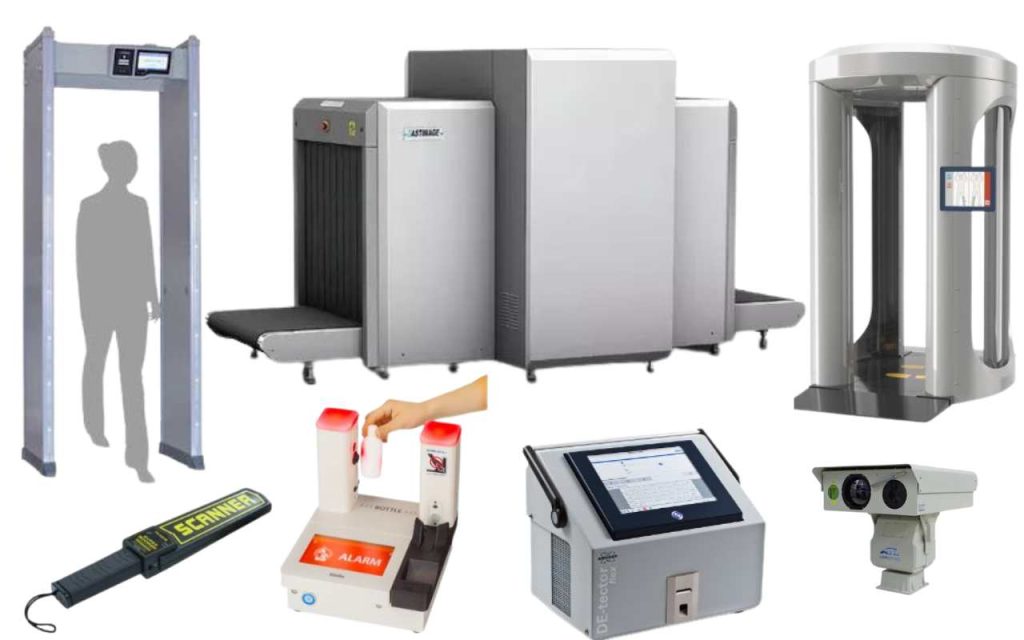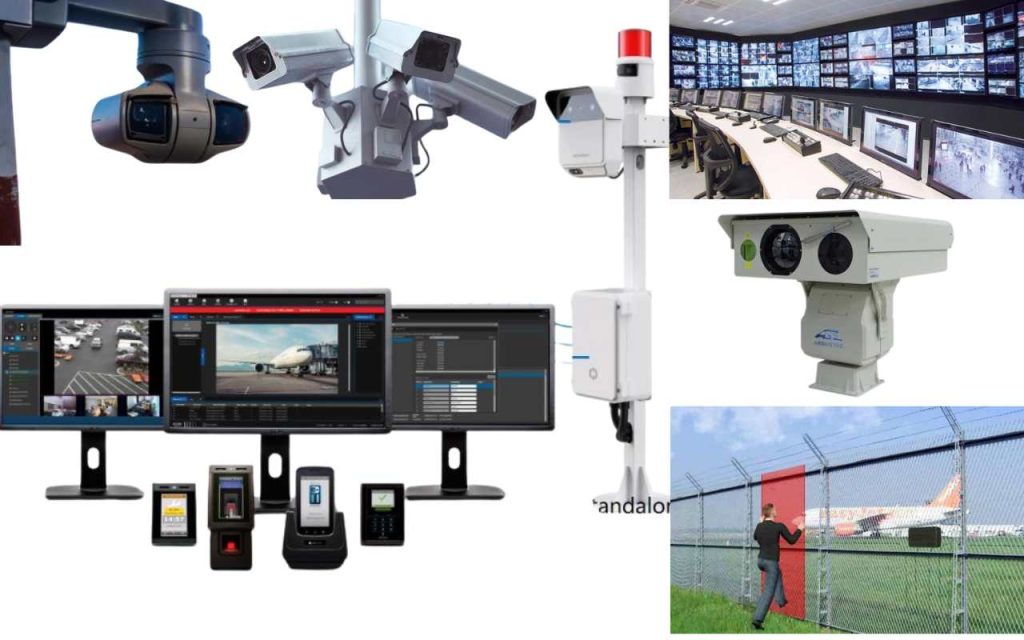Exploring Airport Security Systems in United Kingdom in 2025
The United Kingdom boasts a vibrant network of airports, acting as gateways to international travel and economic exchange. But beneath the bustling departures and arrivals lies a silent guardian: the airport security system. This intricate web of technology and human expertise plays a vital role, ensuring the safety of millions of passengers every year. Let’s delve deeper into this fascinating world and explore the security systems that keep UK skies safe.

Fortress from the Ground Up: A Multi-Layered Approach
Airport security in the UK is a multi-layered approach, encompassing a range of sophisticated equipment, well-defined procedures, and highly trained personnel. Security begins even before you arrive at the airport. Perimeter security systems, like fences equipped with intrusion detection sensors and CCTV surveillance, safeguard the airport grounds. As you approach the terminal, access control systems ensure only authorized individuals gain entry. These systems can employ key cards, biometric authentication (fingerprint or iris scans), or even facial recognition technology.
The Security Checkpoint: A Balancing Act of Efficiency and Vigilance
The security checkpoint is perhaps the most visible aspect of airport security. Here, passengers and their belongings undergo rigorous screening. X-ray scanners analyze carry-on luggage, revealing hidden objects and potential threats. Millimeter wave scanners (millimetre wave scanners in British English) are used for passenger screening, detecting objects concealed beneath clothing. Metal detectors remain a crucial tool, alerting security personnel to any prohibited metallic items.
Explosive detection systems (EDS) play a critical role in identifying explosives and other dangerous materials. These advanced systems can analyze checked baggage and cargo for a wide range of threats. Baggage handling systems themselves are often integrated with security measures, incorporating automated screening and sorting technologies.
Beyond the Checkpoint: Continuous Vigilance
Security doesn’t stop at the checkpoint. CCTV surveillance systems, employing a network of strategically placed security cameras, allow for continuous monitoring of the entire airport. Video analytics software can automatically detect suspicious activity, alerting security personnel to potential threats. Cyber security measures are also crucial, protecting airport IT systems from unauthorized access and potential disruptions.
Regulations and Procedures: The Guiding Principles
Airport security in the UK adheres to strict regulations established by the Civil Aviation Authority (CAA), which implements the guidelines set forth by the International Civil Aviation Organization (ICAO). These regulations outline the specific security measures that airports must implement, ensuring consistency and a standardized level of security across the nation.
Security screening procedures are meticulously designed and regularly updated to address evolving threats. Security personnel undergo rigorous training to ensure they can effectively implement these procedures, identify potential threats, and maintain a courteous and professional demeanor.
The Human Touch: The Unsung Heroes of Airport Security
While technology plays a vital role in airport security, the human element remains irreplaceable. Highly trained security personnel are the ones who interpret the data from security systems, make critical decisions, and interact with passengers. Their vigilance, professionalism, and ability to identify suspicious behavior are essential for maintaining a safe and secure environment.
Benefits of Robust Security Systems
The benefits of a robust airport security system are undeniable. Enhanced security measures not only deter crime and terrorism, but also improve passenger safety. Efficient screening processes can also lead to reduced wait times, making the travel experience more pleasant for everyone. Additionally, effective security systems can act as a deterrent to potential criminals, further bolstering overall security.
The Future of Airport Security: Embracing Innovation
The world of airport security is constantly evolving. New technologies like biometric boarding are being explored, allowing passengers to be identified through facial recognition or iris scans, streamlining the boarding process. Advanced threat detection systems are under development, utilizing artificial intelligence to analyze passenger behavior and identify potential risks.
A Collaborative Effort: Working Together for a Secure Future
Airport security is a collaborative effort. Airlines, airport authorities, security companies, and government agencies all play a vital role in ensuring the smooth and secure operation of airports. By working together, these stakeholders can leverage the latest technologies, implement effective procedures, and foster a culture of security awareness, creating a safe and secure environment for all travelers.
Planning Your Next Trip? A Passenger’s Guide to Security
Knowing what to expect at airport security can help you navigate the process with ease. Here are some tips for a smooth security checkpoint experience:
- Familiarize yourself with the UK’s security regulations.
- Pack efficiently. Avoid carrying prohibited items in your carry-on luggage.
- Arrive at the airport early. Allow ample time for security screening.
- Be prepared to remove your shoes, jacket, and belt.
- Place electronic devices and liquids in separate bins for X-ray screening.
- Be courteous and cooperative with security personnel.

Price list Airport Security Systems
It’s challenging to provide a single example price for airport security systems in the UK due to their complexity and varied configurations. Here’s a breakdown to give you a better understanding:
Factors Affecting Price:
- Type of System: X-ray scanners range from £10,000 to £250,000+ depending on size, features, and detection capabilities. Millimeter wave scanners can cost £50,000 and upwards. Explosive detection systems (EDS) are even pricier, with some models reaching over £1 million.
- Scale of Implementation: A small regional airport will require fewer systems compared to a major international hub. This significantly impacts the total cost.
- Customization and Integration: Integrating various systems seamlessly requires additional configuration and software, driving up the price.
- Maintenance and Support: Ongoing maintenance contracts and technical support add to the overall cost of ownership.
Here’s a possible scenario with estimated costs:
- A small regional airport might require a basic X-ray scanner (£20,000), a walk-through metal detector (£5,000), and a CCTV system with several cameras (£10,000). This could bring the total cost to around £35,000.
- A medium-sized airport might invest in a more advanced X-ray scanner (£50,000), multiple millimeter wave scanners (£150,000 total), an explosive detection system (EDS) for checked baggage (£300,000), and a more comprehensive CCTV network with facial recognition capabilities (£50,000). In this case, the estimated cost could be around £550,000.
Finding Specific Prices:
While I can’t give exact figures, here are some resources to get a better idea of pricing for specific systems:
- Contact Security System Suppliers: Reach out to companies that specialize in airport security solutions. They can provide quotes based on your specific needs.
- Industry Publications: Trade publications and online resources often feature articles or reports that discuss ballpark figures for various security systems.
Get a Quote from Top 12 Global Leader Security Systems Manufacturers
FAQs
What are some of the common security systems used at UK airports?
X-ray scanners for carry-on luggage, metal detectors for passenger screening, and CCTV cameras for surveillance are some of the most widespread security systems in UK airports.
Can I bring liquids through airport security in the UK?
Yes, but with restrictions. Containers must be 100ml or less and placed in a resealable, transparent 1 litre plastic bag. Pack smart and consider checking larger liquids.
How long should I allow for security screening?
While wait times can vary, it’s wise to factor in at least 45 minutes to an hour for security screening at a major UK airport, especially during peak travel times.











